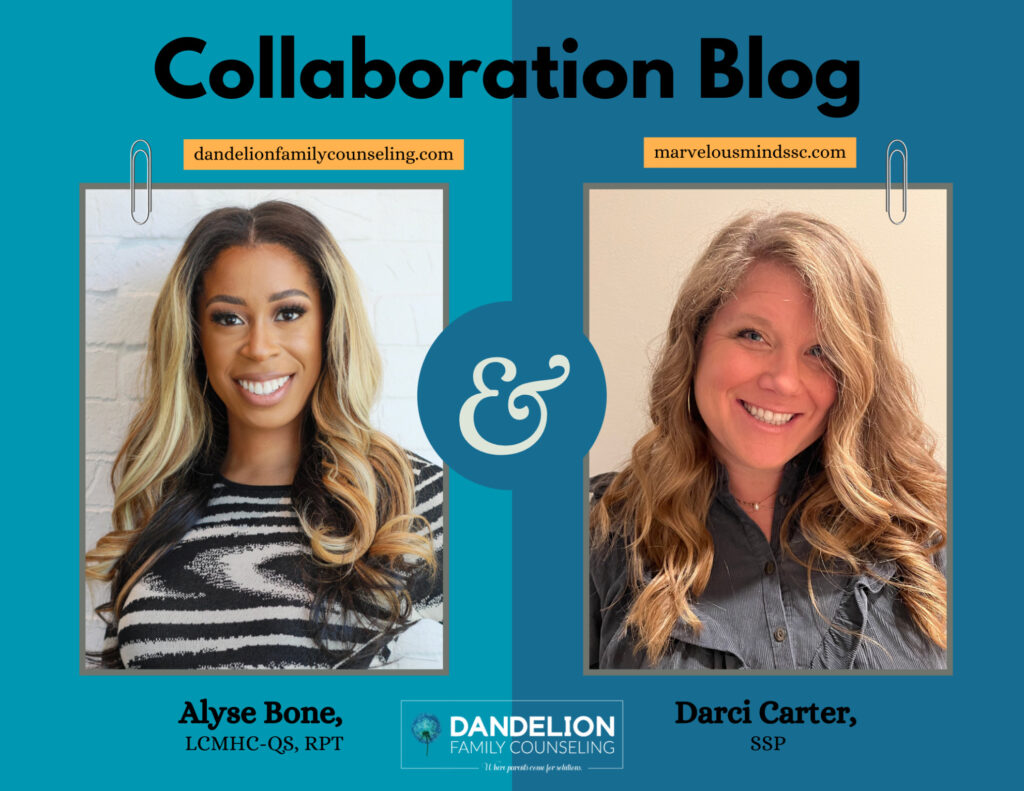Collaboration article with Darci Carter, SSP at Marvelous Minds
Introduction written by Alyse Bone, LCMHC-QS, RPT
All opinions expressed in this blog are solely those of the authors and do not reflect the opinions of Dandelion Family Counseling, PLLC.
(Alyse Bone, LCMHC-QS, RPT): Parents often spend a great deal of time thinking about how to best support their kiddos in the school environment. Given that children spend the vast majority of their lives in school, it is essential that they are well supported in order for them to optimally function and thrive. This does not just include academics; it encompasses their social, emotional, physical and academic selves as well. The public school system has support in place that most parents probably have heard about, but may not fully understand.
Whether your child has been evaluated by their public school or by a private clinician, it can be challenging to understand how a diagnosis will manifest in the school setting and impact your child’s educational capability and performance. You may have some knowledge of IEPs and 504 Plans, but the actual processes and requirements might still feel overwhelming. There’s confusing terminology, data to discuss and review, local and state testing results to analyze and documents to complete and sign.
This is where educational advocates come in! Educational advocates have knowledge about special education programs, IEPs, and 504 Plans and are capable of walking alongside you on this journey. One of these local educational advocates, Darci Carter, shares how this role can best support parents and their kiddos:
(Darci Carter, SSP): Educational advocates can help alleviate the stress, confusion and/or sometimes frustration that can occur for parents. Advocates assist parents in understanding the various processes, guide parents in asking the right questions based on their individual child’s needs, and oversee the legal paperwork that is completed at all meetings. Depending upon the educational advocate’s experience and education, some are able to review testing results and guide parents toward the process that would best suit their child’s educational needs (either IEP or 504). For example, would the child benefit from specially designed instruction (as provided by an IEP), or receive specific accommodations only to level the playing field (as provided on a 504 plan)? Since Covid, there has been an increased amount of mistrust and negativity toward schools, especially when it comes to children with disabilities. Educational advocates play an integral part in bridging these gaps by educating parents, opening lines of positive communication and demonstrating how collaboration can provide resolutions.
Often parents seek an educational advocate from the beginning of the IEP and 504 process (once their child receives a diagnosis), while others will wait until a problem arises or when their child does not appear to be making “adequate” progress. Parents generally want help presenting their concerns to the school and how to best receive information regarding their child’s progress. Parents often ask, “What do I ask for?” “What are appropriate expectations?” “How do I know if my child is making adequate progress?” Depending upon your current situation, if you are unsure or don’t know what to ask for, then seek the assistance of an educational advocate. Bringing an educational advocate to your meetings does not have to be seen as a negative, as long as the individual is collaborative and has a good understanding of your child’s educational needs. *It is recommended to seek support and guidance prior to things turning negative with your child’s school.
Parents know their children the best and truly are their child’s best advocate. By giving parents the appropriate knowledge and various tips and tools to help navigate the various educational processes within our schools, collaboration will occur in a more positive way between parents and schools. Many times, a situation can be resolved through clearer communication or further explanation of the process and/or legal guidelines. Educational Advocates can help break down walls, get teams to collaborate and create resolutions. Overall, educational advocates are there to support and educate parents but, most importantly, advocate and be a voice for the child.
Authors:
Darci Carter is the owner of Marvelous Minds and provides support to parents and children in the academic environment.
Introduction written by Dandelion Family Counseling therapist Alyse Bone, LCMHC-QS, RPT

